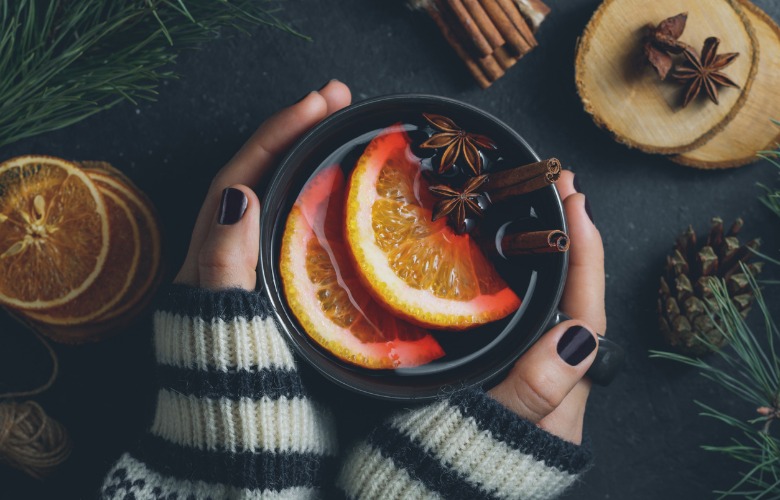Don't Let Gastrointestinal Issues Ruin Your Holiday Feast
Posted by Jemile Nesimi Hobson, B.A. on Oct 12, 2024
Everyone looks forward to delicious holiday food with family and friends. Often so many rich foods and sweets can cause gastrointestinal issues that no one looks forward to. Don’t let bloating, food stagnation and heartburn ruin your holidays. Here are a few natural approaches you can take to get you feeling better in no time.
Digestion
Weak digestion is usually due to deficiency of qi or yang in the spleen, which is the main organ of digestion in TCM. In addition, weak digestion can also be due to dampness caused by over-consumption of sweets. Supporting good digestion is important for overall health, however, stress and diet can strain our digestive systems. It is recommended to eat warm food which is the perfect temperature for our digestion system, in addition eating in moderation is helpful for avoiding food stagnation. Avoid eating too much-fried food, spicy food, dairy, and alcohol as this will just aggravate digestive function and cause discomfort.
Overeating and some food combinations can cause digestion issues, this is known as food stagnation in TCM, a way to relief this is to move the qi in the stomach and stimulate digestion. Curing formula is a good choice for helping with this. Another cause of indigestion is eating while under stress, which causes the liver to be affected. Soothing the liver and stimulating digestion is important, a good formula for this is Shu Gan Wan. Natural ways to help digestion include reducing foods that can cause gas, such as beans, cabbage, and broccoli. Increasing fiber intake can help avoid bloating, high fiber foods like berries, prunes, and dried apricots can help. Drinking lots of water can help flush out toxins and aid in digestion.
Some natural herbal remedies include aloe vera juice, peppermint, licorice, slippery elm, chamomile, and fennel seeds. Triphala is an ayurvedic remedy which can be used for diarrhea, constipation, and indigestion. For heartburn, Pure Encapsulations Heartburn Essentials is a good choice for relieving heartburn and contains an herbal formula including deglycyrrhizinated licorice, marshmallow root, slippery elm, artichoke, and turmeric.
Bloating
Bloating usually occurs when excess gas production causes your belly to feel swollen and full. This most often occurs when there are too many solids, liquids or gasses in your gastrointestinal system. Overindulging during the holiday season can increase your chances of bloating.
A few ways to stop or decrease bloating include:
- Eat small meals, sometimes too much of a good thing can be bad on your stomach.
- Are you allergic or have a food intolerance? Sometimes your body just cannot handle some food because of food sensitivities. Often when eating at parties and other people’s homes, you don’t always know what ingredients were used and they could cause bloating. This includes: lactose, eggs, fructose, wheat, and gluten.
- Take a digestive enzyme – these supplements can help break down hard to digest carbohydrates.
- Load up on fiber and water – this will reduce constipation, which will reduce bloating.
Food Stagnation
Do you feel sluggish and heavy all day? Do you feel like you are in a food coma every time you finish a meal? This may be caused by food stagnation. Food stagnation occurs when you have undigested foods in your gastrointestinal system for hours or even days. The food is stagnant and isn’t digested as quickly as it should. Food stagnation can be chronic, but it can also occur occasionally and during the holiday feasting is common. Food stagnation is recognized in both traditional Chinese medicine and Ayurveda.
Herbs that help with food stagnation include:
- Curing pills, also known as Kang Ning Wan helps eliminate food stagnation and addresses symptoms such as stomach upset, bloating, gas and diarrhea.
- Bao He Wan is an herbal formula designed for “stuck food” that has been traditionally used since the 1400s to help with digestion and food stagnation.
- In Ayurveda, cardamom, trikatu, turmeric, cloves, fennel seeds, and avipattikar churna can all help with food stagnation.
Heartburn
The unwelcome painful burning sensation in your chest or throat is a common occurrence after a large holiday meal. Heartburn is an irritation of the esophagus and is sometimes caused by acid reflux disease – when a muscle in your lower esophagus doesn’t close all the way and allows stomach acid to come into your esophagus.
Natural remedies for heartburn include:
- Aloe juice – soothes the irritation in the esophagus – drink ½ of aloe juice before meals to prevent heartburn.
- Apple cider vinegar – it may seem that this acidic home remedy would do the opposite – but it can ease heartburn – drink a cup of water with 3 tbsp. of apple cider vinegar.
- Make some lifestyle changes – lose weight, quit smoking and try to stay away from spicy foods, fatty foods, caffeine, and sodas – all of which contribute to heartburn.
- Take an herbal formula containing both marshmallow root and licorice root – both help with heartburn and reflux.
- Try traditional Chinese medicine – Six Gentleman Teapills, also known as Liu Jun Zi Tang, is used for a range of digestion issues, including heartburn, indigestion, food allergies, celiac disease, and fatigue after meals.

Healing Spices of the Holidays
Spices have a deep connection and warm feeling to the winter months. We all love the familiar scents that winter brings, whether it is the spices we add to our holiday desserts or the seasonal candles we place in our homes to bring us comfort for the cold days ahead. We put these spices in our warm cups of tea as we snuggle up to a good book and we eat them in the comfort foods we make. Perhaps we never think about the health benefits these spices offer, but they are rich in a variety of nutrients and anti-oxidants. Here are a few spices that we associate with winter days and how they can benefit our health:
Cinnamon
Cinnamon is an ancient herbal medicine mentioned in Chinese texts for the past 4,000 years. Cinnamon trees grow in tropical areas, including parts of India, China, Madagascar, Brazil, and the Caribbean. Cinnamon has a broad range of medicinal uses in many different cultures, such as diarrhea, colds, anti-aging, supports normal menstruation, and normal erectile function. Cinnamon also helps stimulate blood flow and supports normal blood sugar levels and fat metabolism in the body. This spice contains manganese, dietary fiber, calcium, and iron. Since it is difficult to benefit from this spice by solely eating it, it is best taken in supplement form.
Ginger
Ginger has been used as a natural remedy for thousands of years. Ginger is in the same family as turmeric and cardamom. Ginger has a variety of health benefits, such as nausea-fighting properties, eases motion sickness, eases digestion, antioxidant support, supports normal blood flow and circulation, and relieves menstrual cramps. Ginger is also a great source of potassium.
Cloves
Cloves, an aromatic spice that contains an anti-inflammatory chemical called eugenol. Cloves are also supporting normal insulin function and can provide a numbing effect with bacteria-fighting powers for toothaches. Cloves also relax the stomach and can help alleviate vomiting, diarrhea, and stomachaches.
Star Anise
Star Anise is a star-shaped fruit of the evergreen plant known as illicium verum. Anise has a licorice-like flavor and originated in southern China. Anise contains shikimic acid, an antioxidant-rich nutrient that can help boost the immune system. In addition, this spice contains antibacterial and antifungal, and antioxidant properties. Anise can be used for symptoms such as indigestion, heartburn, bloating, and nausea.
Peppermint Leaves
Peppermint is an ancient herb used since antiquity and is packed with antioxidants and phytonutrients. Peppermint has a relaxing property and can be helpful for indigestion, nausea, gas, diarrhea, and other digestive issues. Peppermint oil is cooling and energizing, by adding a few drops to your bath or used as aromatherapy it has been shown to provide stress relief. It has also been shown to have anti-inflammatory and astringent properties benefitting the skin.
The holidays bring delicious meals that are often entangled with family traditions and once a year of excitement. Overindulging, however, can take the fun out of enjoying the holidays. Eat-in moderation, smaller meals, and try our holiday eating tips to help avoid bloating, food stagnation and heartburn.












